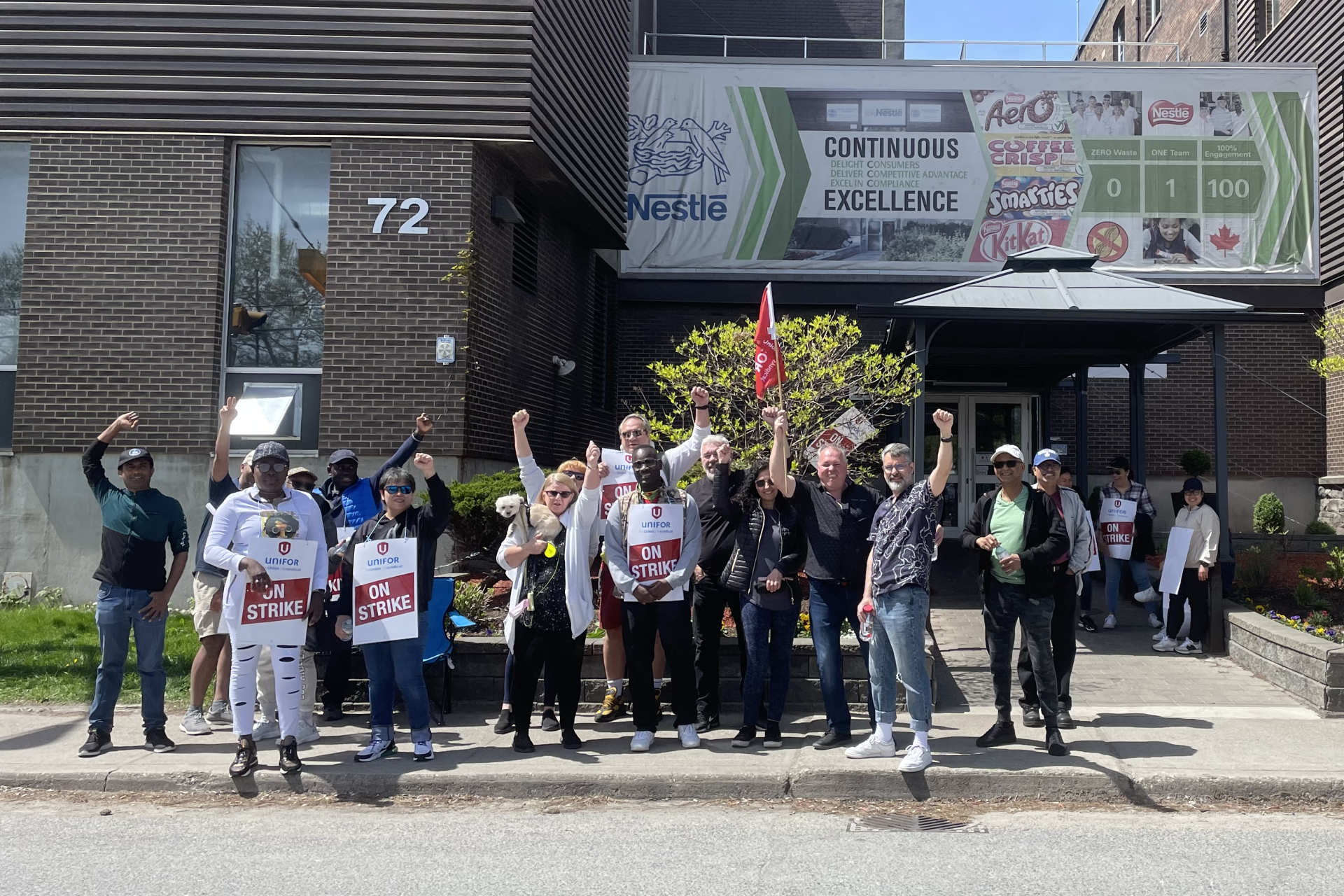
Almost 500 Nestlé chocolate factory workers are on strike in Toronto, after rejecting a tentative agreement that would have meant another round of real wage cuts for the workers.
On May 5, the members of Unifor Local 252 rejected an agreement brokered by their leadership by a vote of 65 per cent, and 99 per cent of the members voted to strike. The proposal by Nestlé was a “slap in the face” says Donna, a strike leader. And, the workers rightly rejected it.
Prior to this round of talks, Nestlé suddenly and without warning froze the workers’ Cost of Living Adjustments (COLA). Nestlé continues to cite “higher costs of production” to justify maintaining the freeze. “But what about [the] cost of living?” says a union member. “We have people working here who have a hard time living in the city. We know how expensive rent [and] mortgages are, and the company does not seem to reflect on that at all, [and] does not want to offer much in terms of anything.”
The workers are also fighting for justice for the plant’s 60+ seasonal contract workers. These workers, categorized under a “P0” employment tier, are paid minimum wage and denied benefits—even though they do the same work as their full-time colleagues.
In the rejected tentative agreement, Nestlé proposed proportional wage increases based on workers’ current tier, which would effectively exacerbate the wage gap between each tier. “So if you were P6, you were making more money . . . the lower your wages, the lower your raise was.” says Donna. “You got more of a raise in this collective agreement rather than the P1s. So it was unfair across the board completely.”
“It’s a good thing that we stood together and voted to strike,” one worker told us, “because we could have had a way where [people] could have been manipulated into [taking offers] and leaving some people with nothing.”
The strategy of hiring temporary workers to replace the permanent workforce is a clear way to depress wages and benefits for everyone else. “They’re creating a system that actually incentivizes people to leave,” says one striking worker. “The less tenured employees you have, the less benefits you have to pay . . . the more they can depend on contract and seasonal employees.”
There are 65 “P0” workers out of 480 total workers in this chocolate factory, which at one point employed over 1,500 total workers, the majority of whom have been laid off, forcing everyone else to pick up the slack.
This has been quite lucrative for Nestlé’s owners, however. These parasites contribute nothing to the running of these plants. As Marx explained, the basis for all profits is the unpaid labour of the working class. Nestlé’s owners live off the labour of the working class, in their plants and throughout their global supply chain. As one striker put it: “We are the people that make up this city . . . we are working here and making these products, these food products that . . . the people can’t afford [themselves].”
Nestlé profits to the degree it pushes its workers to their limits, attacks their wages and benefits and conducts predatory practices abroad—like exploiting child slaves in Ivory Coast, stealing water across Asia and the rest of Africa, and financing plants in Israeli settlements on Palestinian land.
On the latter point, the workers had fiery, fighting words in support of the students running the pro-Palestine encampment at the University of Toronto. “It’s the young ones that are going to make the change . . . they’re the ones that have to conquer all this crap that’s going on right now,” said Donna, “just keep going till you get what you want.” Another worker said this when asked to give advice to the students: “You can’t fold when things get hard . . . You’ve got to keep pushing!”
The struggles of the Nestlé workers and the students occupying their campus are connected. They are fighting the same capitalist ruling class that exploits workers and oppresses Palestinians.
This strike is just one expression of the discontent in society. Over the past year we’ve seen a big uptick in work stoppages, mass movements, and a general questioning of the status quo, everywhere. These oppositional currents must be harnessed and coordinated against the ruling class—including the owners of Nestlé—to put the working class in power.

